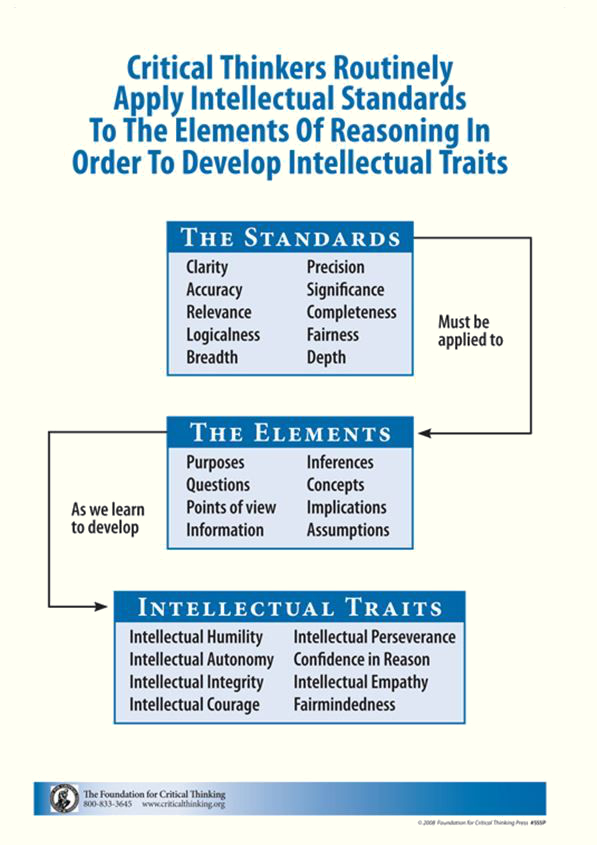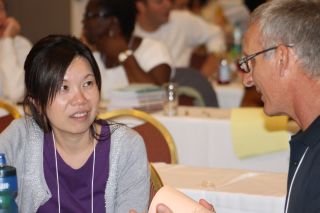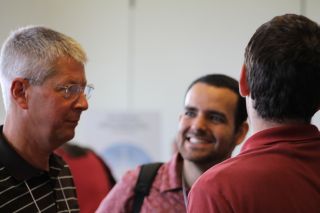Day One, Friday: The Foundations of Critical Thinking Choose one of these foundational sessions for the first day of the academy:
• Foundations of Critical Thinking: College and University... Dr. Gerald Nosich
• Foundations of Critical Thinking: K-12... Dr. Paul Bankes The first day of this academy will focus on the fundamentals of critical thinking. This session will lay the foundation for the other workshop sessions. It will introduce you to some of the most basic understandings in critical thinking – namely, how to analyze thinking, how to assess it, and how to develop and foster intellectual virtues or dispositions.
One conceptual set we will focus on is the 'Elements of Reasoning,' or 'Parts of Thinking.' The Elements or Parts of Reasoning are

those essential dimensions of reasoning that are present whenever and wherever reasoning occurs —independent of whether we are reasoning well or poorly. Working together, these elements shape reasoning and provide a general logic to the use of thought. They are presupposed in every subject, discipline, and domain of human thought.
A second conceptual set we will focus on is that of universal 'Intellectual Standards.' One of the fundamentals of critical thinking is the ability to assess reasoning. To be skilled at assessment requires that we consistently take apart thinking and examine the parts with respect to standards of quality. We do this using criteria based on clarity, accuracy, precision, relevance, depth, breadth, logic, and significance. Critical thinkers recognize that, whenever they are reasoning, they reason to some purpose (Element of Reasoning). Implicit goals are built into their thought processes. But their reasoning is improved when they are clear (Intellectual Standard) about that purpose or goal. Similarly, to reason well, they need to know that - consciously or unconsciously - they are using relevant (Intellectual Standard) information (Element of Reasoning) in their thinking. Furthermore, their reasoning improves if and when they make sure that the information they are using is accurate (Intellectual Standard).
A third conceptual set in critical thinking is that of 'Intellectual Virtues,' 'Traits,' or "Dispositions.' Critical thinking does not entail merely intellectual skills. It is a way of orienting oneself in the world. It is a way of approaching problems that differs significantly from that which is typical in human life. People may have some critical thinking skills and abilities, and yet still be unable to enter viewpoints with which they disagree. They may have some critical thinking abilities, and yet still be unable to analyze the beliefs that guide their behavior. They may have some critical thinking abilities, and yet be unable to distinguish between what they know and what they don’t know, to persevere through difficult problems and issues, to think fairmindedly, to stand alone against the crowd. Thus, in developing as a thinker, and in fostering critical thinking abilities in others, it is important to develop Intellectual Virtues – the virtues of fairmindedness, intellectual humility, intellectual perseverance, intellectual courage, intellectual empathy, intellectual autonomy, intellectual integrity, and confidence in reason.
Days Two and Three,
Saturday and Sunday: Choose one of the following: Practical Strategies for Improving Student Learning... Dr. Paul Bankes To study well and learn any subject is to learn how to think with discipline within that subject. It is to learn to think within its logic, to:
- raise vital questions and problems within it, formulating them clearly and precisely.
- gather and assess information, using ideas to interpret that information insightfully.
- come to well-reasoned conclusions and solutions, testing them against relevant criteria and standards.
- adopt the point of view of the discipline, recognizing and assessing, as need be, its assumptions, implications, and practical consequences.
- communicate effectively with others using the language of the discipline and that of educated public discourse.
- relate what one is learning in the subject to other subjects and to what is significant in human life.
To become a skilled learner is to become a self-directed, self-disciplined, self-monitored, and self-corrective thinker who has given assent to rigorous standards of thought and gained mindful command of their use. Skilled learning of a discipline requires that one respect the power of it, as well as its - and one’s own - historical and human limitations. This session will offer strategies for helping students begin to take their learning seriously. This session focuses on a number of instructional ideas that are based in the idea that substantive teaching and learning can occur only when students take ownership of the most basic principles and concepts of the subject. These strategies are rooted in a vision of instruction implied by critical thinking, and an analysis of the weaknesses typically found in most traditional didactic lecture/quiz/test formats of instruction. This session then focuses on some basic instructional strategies that foster the development of student thinking, and on strategies that require students to think actively within the concepts and principles of the subject
Placing Critical Thinking at the Core of the Core of the Curriculum... Dr. Gerald Nosich A key insight into content, and into thinking, is that all content represents a distinctive mode of thinking. Math becomes more intelligible as one learns to think mathematically. Biology becomes more intelligible as one learns to think biologically. History becomes more intelligible as one learns to think historically. This is true because all subjects are generated by thinking, organized by thinking, analyzed by thinking, synthesized by thinking, expressed by thinking, evaluated by thinking, restructured by thinking, maintained by thinking, transformed by thinking, LEARNED by thinking, UNDERSTOOD by thinking, and APPLIED by thinking. If you try to take the thinking out of content, you have nothing - literally nothing - remaining. Learning a unique system of meanings is the key to learning any content whatsoever. In this session we will explore the intimate relationship between content and thinking, and will argue for the importance of placing critical thinking concepts and principles at the very heart of teaching and learning in higher education.




